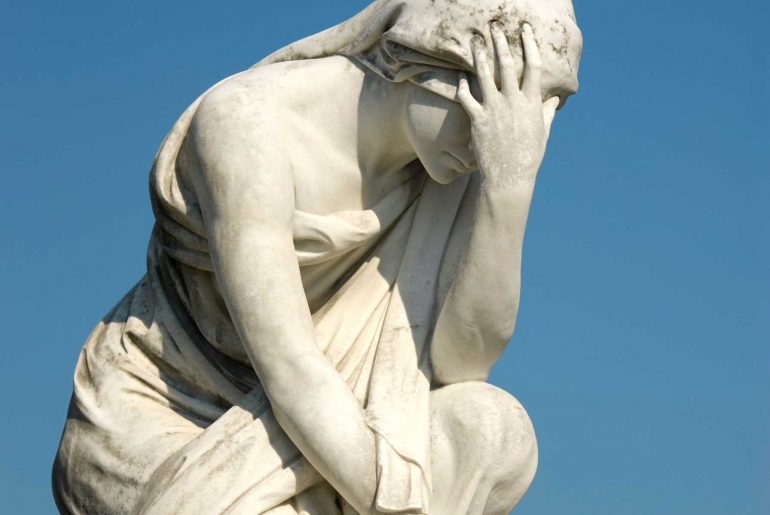This post is part of the series Depression
Other posts in this series:
- Happy Pills and other myths (Current)
- Suicide – the truth about Romeo and Juliet
- Drained of all colour: What is depression?
Suffering from depression is hard. It’s possibly one of the toughest illnesses out there because it corrodes your very core, your self-esteem, your connection with others. Help is available. I tell my patients that together we will always win against depression, even if the path is rocky.
I make use of many modalities to treat depression: therapy, diet, exercise, creative and spiritual outlets, and medication.
Medication is a godsend in the management of depression. Yet it is the modality that carries with it the most resistance and false preconceptions.
Some of the questions my patients most frequently ask are:
- Is it a “happy” pill?
Sorry to disappoint, antidepressants won’t make you happy. The brain is an organ, and like any organ in the body, it can get sick. When it gets sick, it displays several psychological and physical symptoms. Depression is one such brain illness with psychological symptoms such as helplessness, hopelessness and psychological distress. It also presents with physical symptoms like fatigue, poor concentration, pain, eating or sleeping too much or too little.
Antidepressants treat the illness of depression. You can achieve happiness by attending to your life – the good and bad parts. Once the antidepressants have restored your brain functioning, what you do next in the pursuit of happiness is up to you.
- Can I stop taking it when I feel better?
Unfortunately, no. You will begin to feel better when your neurotransmitter levels are more stable; this typically happens at 3-6 weeks after starting your medication. Healing of your neurons occurs when dendrites (little branches at the end of your neurons) which were damaged when you were ill, start to regrow. The central nervous system heals very slowly, so this could take months.
There are varying recommendations as to how long you should carry on with treatment. We now know that longer treatment duration is probably better. My general recommendation to patients is to continue with treatment for two years in the first episode, five years in the second episode and by the time the third episode happens, to consider it a chronic disease needing long-term medication. Obviously, each patient is an individual, and several factors are taken into consideration when deciding to discontinue treatment.
Under certain circumstances, such as bipolar mood disorder or premenstrual dysphoric disorder, I might recommend a brief course of antidepressant use.
- Will I get addicted to them?
To get addicted to something, you must take it and have an immediate desired effect, like getting high or calming down. Then tolerance builds up: you need more and more for the same effect. Eventually, you are taking the drug to avoid going into withdrawal; that is, feeling terrible when you don’t take it.
With antidepressants, there is no immediate positive effect. In fact, the first two weeks can be horrible as your body gets used to side effects. After about a month, you should start feeling better. Not good, better.
Not much in favour of causing addiction.
*There is a withdrawal syndrome with some anti-depressants if you suddenly stop them. This can be managed by slow tapering.
- Will I feel numbed or less creative on antidepressants?
Depression numbs you. For many people, depression is not sadness. It is nothingness. No happiness, no sadness. Just every day, a robotic monotone. With no motivation or ability to concentrate, depression strips you of your creativity.
Antidepressants treat depression, thus restore emotions and creativity.
Some people do feel numbed on certain antidepressants. It is an unwanted side effect. If this happens to you, speak to your doctor. You may need to change your antidepressant.
Antidepressants are a group of medications that treat the illness of depression. People who suffer from depression do better when treated than those who don’t receive treatment. We do not deny people suffering from other illnesses, like diabetes or TB, appropriate treatment. Then why do we advise people suffering from depression to “toughen up” or “try harder”? Isn’t it time that the misconceptions of psychiatric treatment are challenged?

Continue reading this series:
Suicide – the truth about Romeo and Juliet








3 Comments
There is another insidious myth about depression that I think needs a mention i.e. that depression is somehow the outcome of a character flaw or moral defect. Of course put that way everyone would deny it. But I hear it in disguised forms nearly every day: “If she would just do it for the kids,” “she is so self absorbed – I wish she would just get over herself,” and my personal most hurtful expression: “Just pull yourself together!”
If I could pick myself up by my shoelaces I would and if I could magically “pull myself together” by the seer might of my will I would have long ago – Oh and I would have fixed all my fiends too. Anyway I am no longer depressed but I remember how those throw away remarks used to cut.
It is time for the stigmatisation to end. Thanks for the great idea of myth busting.
Just one last thought and then I will go back to my own work: I’m not even sure that depression in particular and maybe several other psychological disorder are a “sickness” of the brain as you put it. If it were, then why would all mammals have analogous neurophysiological states. I am thinking about learned helplessness in particular. That seems to me more like an evolutionary adaptation than a pathology. If you are a mammal that is powerless to change your very stressful or dangerous environment, the sooner you learn that lesson and adapt the better your chances of survival. Such adaptations will include, conserving energy including physical and psychological energy, attenuating the activity of certain neural circuits, reducing libido (reproduction under extreme stress or danger is a huge impediment), not engaging in conflict and generally being as inconspicuous as possible. On the other hand hypervigilance and even perhaps a hint of paranoia would probably pay off well as a strategy. My point is that all of these are good adaptations to learned helplessness in evolutionary environment that we no longer occupy, so depression may be the way our brain is wired to cope with ancient threats that we were once powerless to deal with. The major problem is that our biological evolution has not kept pace with out cultural evolution which is literally in the space age / information age / nuclear age / anthropocene. And I don’t think we will ever catch up, sadly.
P.S. All of the antidepressants out there have gone through clinical trials on non-human animals first in which learned helplessness was induced as an analogue to depression.